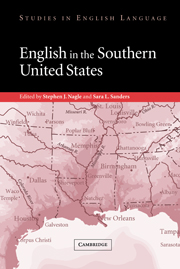Book contents
- Frontmatter
- Contents
- Notes on the contributors
- Acknowledgments
- Introduction
- 1 The origins of Southern American English
- 2 Shakespeare in the coves and hollows? Toward a history of Southern English
- 3 Eight grammatical features of southern United States speech present in early modern London prison narratives
- 4 The shared ancestry of African-American and American-White Southern Englishes: some speculations dictated by history
- 5 The complex grammatical history of African-American and white vernaculars in the South
- 6 Grammatical features of southern speech: yall, might could, and fixin to
- 7 Sounding southern: a look at the phonology of English in the South
- 8 Vowel shifting in the southern states
- 9 Enclave dialect communities in the South
- 10 Urbanization and the evolution of Southern American English
- 11 The Englishes of southern Louisiana
- 12 Features and uses of southern style
- References
- Index
6 - Grammatical features of southern speech: yall, might could, and fixin to
Published online by Cambridge University Press: 22 September 2009
- Frontmatter
- Contents
- Notes on the contributors
- Acknowledgments
- Introduction
- 1 The origins of Southern American English
- 2 Shakespeare in the coves and hollows? Toward a history of Southern English
- 3 Eight grammatical features of southern United States speech present in early modern London prison narratives
- 4 The shared ancestry of African-American and American-White Southern Englishes: some speculations dictated by history
- 5 The complex grammatical history of African-American and white vernaculars in the South
- 6 Grammatical features of southern speech: yall, might could, and fixin to
- 7 Sounding southern: a look at the phonology of English in the South
- 8 Vowel shifting in the southern states
- 9 Enclave dialect communities in the South
- 10 Urbanization and the evolution of Southern American English
- 11 The Englishes of southern Louisiana
- 12 Features and uses of southern style
- References
- Index
Summary
Introduction
Michael Montgomery has pointed out that Southerners “maintain grammatical categories and structures having no exact equivalent or paraphrase elsewhere in American English” (Montgomery 1996a: 1–2). There are gaps in Standard English, and Southern English has creative ways of filling them. This chapter explores three uniquely southern structures and the special meanings associated with them. Singled out by Reed and Reed (1996) in 1001 Things Everyone Should Know About the South, yall, might could, and fixin to represent three grammatical features particularly associated with southern speech. They appear in popular dictionaries of southern speech (Mitchell 1976, 1980), in literary works representing Southern dialect (Burkett 1978), and in films including southern characters (Herman 1947).
Of course, not every Southerner speaks the same variety of Southern English. Regional and social factors contribute to dialect variation. Some varieties are associated with mountainous areas, others with coastal communities; some with the city, others with the country; some with African Americans, others with European Americans; some with men, others with women; some with upper socioeconomic classes, others with middle and working classes. Even the same individual varies his or her speech according to the formality of the occasion, the listeners who are present, the subject being discussed, and so on (cf. Labov 1972b; Wolfram and Fasold 1974). Consequently, the syntactic features explored here will not characterize all southern speakers.
- Type
- Chapter
- Information
- English in the Southern United States , pp. 106 - 118Publisher: Cambridge University PressPrint publication year: 2003
- 14
- Cited by



